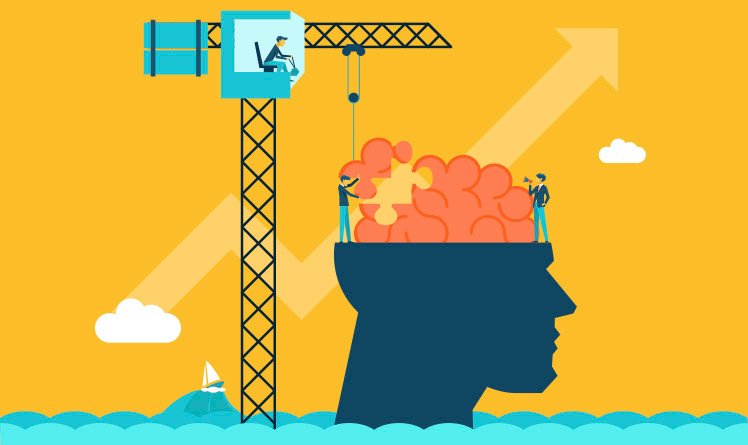How to reprogram your mind for success

|
Getting your Trinity Audio player ready...
|
In today’s world, achieving success requires more than just technical skills and knowledge. The mind plays a crucial role in determining our success, and reprogramming it can be the key to achieving our most ambitious goals. In this article, we’ll explore some strategies that can help you reprogram your mind for success.
Defining what success is
Before thinking about reprogramming our minds for success, it is necessary for each of us to have a clear understanding of what success is. Success is a subjective and multifaceted concept that can vary widely between different people and cultures. In general terms, success can be defined as the achievement of goals or the obtaining of desired results in various areas of life, such as career, relationships, finances, health, and personal development.
For social reasons, we often focus on material things. In other words, we tend to associate success with financial wealth, with the acquisition of luxury homes and cars and things like that. Let's reflect on what success can mean in different areas:
Professional success
For many people, professional success is an important aspect of life. It could mean achieving a prominent position at work, being recognized by peers, earning a good salary, or simply finding satisfaction and purpose in your career.
Financial success
Financial success is the most common form of success. It refers to the ability to earn and manage money effectively. This can include having a steady income, saving for the future, investing wisely, and having the freedom to make life choices without undue financial worries. Despite being the area that receives the most focus when we talk about success, there are taboos and some prejudices when an individual openly says that they want a luxurious and comfortable life.
Personal success
Personal success can involve developing and cultivating meaningful relationships, as well as emotional and spiritual growth. It can mean having a happy family, maintaining deep friendships, finding a loving partner, or simply being at peace with yourself.
Success in health and well-being
Above all, maintaining good physical and mental health is an essential way to success. Above all, it can include healthy habits, regular exercise, a balanced diet, and a calm and peaceful mind. resilient.
Academic success
For students and academics, success can mean getting good grades, completing difficult courses, publishing relevant research, or achieving an advanced degree.
Success in social contribution
Some people measure their success by the difference and impact they make in the world. So, you can include the volunteer work, activism, charity, or any form of positive contribution to society.
Success in personal development
Success in personal development can involve continued growth as an individual, learning new skills, overcoming personal challenges, as well as becoming the best version of yourself.
Life balance
For many, success means finding a healthy work-life balance, where there is enough time for work, family, leisure and rest.
Look inside yourself
Asking “what is success?” can lead to deep reflection on personal values and what is truly important to each individual. Therefore, success is not a one-size-fits-all formula; it is a personal journey that involves identifying your goals and values and working towards achieving them.
Ultimately, success is about finding satisfaction and fulfillment in the various areas of life, as defined by one's own values and goals. It is a continuous search for growth, happiness, and purpose.
The importance of mindset for success
Now that we’ve talked about success, let’s talk about the mindset that leads to it. First, mindset is the foundation of our daily actions and decisions, and it can be shaped and reprogrammed to enable us to overcome obstacles and improve our results.
Therefore, a change in mindset is extremely important in the pursuit of success, because the way we think and see the world can directly influence our actions, behaviors and results. First of all, mindset determines our worldview, beliefs, attitudes and perceptions, shaping the way we face challenges, seek opportunities and deal with adversity.
Here are some reasons why changing your mindset is essential in the pursuit of success:
Overcoming limiting beliefs
We often carry limiting beliefs that prevent us from reaching our true potential. These negative beliefs can undermine our confidence and prevent us from taking bold initiatives. So, by reprogramming our mind and replacing limiting beliefs with positive, empowering thoughts, we can unleash our true inner power.
Facing challenges with resilience
A positive and resilient mindset helps us face challenges with courage and determination. Instead of feeling defeated in the face of difficulties, a growth mindset allows us to learn from obstacles and seek creative solutions.
Turning failures into opportunities
The right mindset helps us see failure as an opportunity to learn and grow, rather than a dead end. With a growth mindset, we view failure as part of the development process rather than a sign of inadequacy.
Stay focused and motivated
A focused and motivated mindset keeps us committed to our goals, even when we face challenges or obstacles. In short, determination and intrinsic motivation help us persevere in our pursuit of success, even when things get tough.
Attract opportunities
A positive and confident mindset attracts opportunities and positive connections. In this way, the way we present ourselves to the world affects how others see and treat us. After all, an open and positive mindset can open doors to new opportunities and partnerships.
Increase self-confidence
Changing our mindset can strengthen our self-confidence, allowing us to take calculated risks and seek new challenges. Therefore, when we believe in our capabilities, we are more likely to take risks and seek success.
Therefore, changing our mindset is essential to achieving success, as it influences our perspective, our choices and our actions. A positive, resilient and growth-oriented mindset empowers us to face challenges, learn from experiences and pursue our goals with confidence and determination.

The practice of mindfulness
The practice of mindfulness can be a powerful tool for reprogramming the mind, allowing people to have greater control over their thoughts and emotions. Mindfulness is a technique that involves being fully present in the present moment, with an attitude of non-judgment and acceptance. Therefore, this practice can help reprogram the mind in several ways:
Self-awareness:
THE mindfulness increases self-awareness by allowing people to recognize and observe their thoughts and emotions without becoming attached to them. This helps identify negative thought patterns or limiting beliefs that may be preventing progress or well-being.
Stress and anxiety reduction:
The regular practice of mindfulness has been linked to reducing stress and anxiety. By being present in the present moment, people can release worries about the past or future, reducing anxiety and allowing for a calmer, more focused mind.
Emotional detachment:
THE mindfulness teaches people to observe their emotions without reacting impulsively to them. This helps develop a sense of emotional detachment, allowing people to not be overwhelmed by negative emotions and helps them avoid impulsive reactions.
Focus and concentration:
When practicing the mindfulness, people train their minds to stay focused on the present. This can improve concentration and productivity, allowing them to focus on tasks more efficiently and effectively.
Self-acceptance:
THE mindfulness encourages the practice of an accepting attitude toward oneself and others. This includes accepting thoughts and emotions without judgment. By practicing self-acceptance, people can be kinder to themselves, releasing self-criticism and perfectionism.
Change of perspective:
The practice of mindfulness can help develop a more positive and optimistic outlook on life. This can lead to a reprogramming of the mind, replacing negative thoughts with more constructive and empowering thoughts.
This way, when practicing mindfulness regularly, people can develop a healthier, more balanced mindset, allowing them to face life's challenges with more calm, clarity and resilience.
Neuro-Linguistic Programming (NLP)
Neuro-Linguistic Programming (NLP) is an approach that aims to understand how the human mind works and how it language influences our thoughts and behaviors.
THE NLP NLP can be a powerful tool for reprogramming the mind, allowing people to identify limiting mental patterns and replace them with more positive and empowering patterns. So here are some ways NLP can help with reprogramming the mind:
Identification of limiting patterns:
Through NLP, people can learn to identify patterns of thoughts, beliefs, and behaviors that may be limiting their growth and success. By becoming aware of these patterns, they can begin to question them and seek out more helpful and positive alternatives.
Reframing (cognitive restructuring):
NLP teaches techniques of reframing, which involve changing the perspective on a situation or belief. By changing the way we interpret events or thoughts, we can create more positive and motivating meanings, allowing more constructive emotional and behavioral responses to develop.
Anchoring:
NLP uses the anchoring technique, which consists of associating a specific emotional state with a stimulus or physical gesture. This technique can be used to bring positive and motivating feelings in challenging moments, allowing the mind to reposition itself to a more capable and confident state.
Modeling excellence:
NLP emphasizes the importance of learning from successful people. Through modeling, people can study and adopt mental and behavioral strategies used by those who have achieved success in specific areas. This allows them to adopt more effective and successful mental patterns.
Changing limiting beliefs:
NLP offers techniques to challenge and replace limiting beliefs with more positive and empowering beliefs. In this way, by changing our beliefs, we can reprogram our mind to believe in our potential and ability to overcome challenges.
Alignment of representational systems:
NLP identifies three main representational systems – visual, auditory and kinesthetic. Aligning these systems represents a mental congruence that facilitates internal communication and can help reduce internal conflict.
Thus, NLP offers a variety of techniques and approaches that can help reprogram the mind, allowing people to identify and modify limiting mental patterns and develop more positive and empowering patterns. Therefore, by learning to use NLP effectively, individuals can achieve greater mental clarity, self-confidence and motivation, facilitating the pursuit of personal and professional success.
Positive psychology
THE positive psychology is an approach that focuses on the study and promotion of psychological well-being, seeking to identify and develop the positive aspects of the human experience.
This approach can be a valuable tool for reprogramming the mind, as it emphasizes cultivating positive emotions, personal strengths, and a more optimistic outlook on life. Here are some ways positive psychology can help reprogram the mind:
Focus on personal strengths and virtues:
Positive psychology encourages people to identify and utilize their personal strengths and virtues. Therefore, by focusing on what they are good at and what they do well, people can develop a more positive self-image and increase their self-confidence.
Gratitude and appreciation:
Practicing gratitude is an important component of positive psychology. By cultivating a sense of gratitude and appreciation for the good things in their lives, people can reprogram their minds to focus on the positives and blessings rather than fixating on the hardships.
Resilience and overcoming adversity:
Positive psychology emphasizes resilience and the ability to overcome challenges. Consequently, by adopting a more optimistic and growth-oriented outlook, people can reprogram their minds to face adversity with courage and determination.
Cultivation of positive emotions:
Positive psychology encourages the practice of positive emotions, such as joy, hope, and compassion. By cultivating these emotions, people can develop a more positive mindset and learn to deal with negative emotions in a healthier way.
Focus on the present and the future:
Positive psychology encourages people to focus on the present and envision a more positive future. By letting go of past worries and focusing on future possibilities, the mind can be reprogrammed to feel more hopeful and optimistic.
Self-compassion:
Positive psychology promotes self-compassion by encouraging people to be kind to themselves and treat themselves with care and understanding. So by developing a kinder attitude toward themselves, people can reprogram their minds to feel more secure and confident.
In this way, positive psychology can be a powerful tool for reprogramming the mind, promoting a more positive outlook, personal strengths, and resilience. By adopting the principles of positive psychology and practicing its techniques, people can cultivate a healthier, more constructive mindset, improving their psychological well-being and their pursuit of success and happiness.
Neuroscience
THE neuroscience Neuroscience is the study of the nervous system and the brain, and it can offer valuable insights into how the mind works and how we can reprogram it to achieve positive changes. By understanding how the brain works, it is possible to adopt specific strategies for reprogramming the mind. Here are some ways neuroscience can help in this process:
Brain plasticity:
Neuroscience has discovered that the brain is highly plastic, meaning it can change and adapt over time. This means that we can reorganize our neural circuits and create new brain connections by adopting more positive and healthy habits and thought patterns. Regularly practicing new behaviors and thoughts can lead to structural and functional changes in the brain, helping to reprogram the mind.
Neurotransmitters and emotions:
Neuroscience shows us how neurotransmitters, such as serotonin and dopamine, play a fundamental role in regulating emotions. Therefore, by understanding the influence of these neurotransmitters on our mood and emotional well-being, we can adopt practices and habits that stimulate the release of positive neurotransmitters, such as physical exercise, meditation and pleasurable activities, helping to reprogram the mind for more positive emotions.
Mindfulness and mindfulness:
Neuroscience has studied the effects of mindfulness in the brain, demonstrating that regular practice of meditation and mindfulness can result in positive changes in brain structure and function. The mindfulness can reduce activity in brain areas related to rumination and excessive worry, helping to reprogram the mind to a calmer, more mindful state.
Reconditioning fear and anxiety:
Neuroscience studies show that it is possible to recondition the brain to deal with fears and anxieties. Gradual exposure to feared situations, combined with cognitive restructuring techniques, can lead to changes in the way the brain responds to threatening stimuli, reducing the intensity of fear and anxiety reactions.
Learning and positive reinforcement:
The neuroscience of learning and positive reinforcement highlights the importance of rewards and positive feedback in forming new behaviors and habits. By adopting strategies that positively reinforce new patterns of thinking and behavior, we can create new neural connections that support the reprogramming of the mind.
Neuroscience provides a solid foundation for understanding how the brain works and how we can reprogram the mind to achieve positive changes. Through consistent practice of healthy habits, understanding the neural processes involved in emotions, and using techniques such as mindfulness, we can promote the reprogramming of the mind and achieve greater emotional well-being, resilience and success in our lives.
Reprogramming your mind is investing in yourself
The tools mentioned here can be the starting point for a definitive change in your life. We will bring more articles here on the blog to help you on this journey of self-knowledge and success. The first step is to be willing to change. The tools help, but we are the ones who change. Onward to change!
Recommended Reading:
Reprogram Yourself for Success – Break Free from Blockages and Limiting Beliefs Using NLP

Marcel Castilho is an expert in neuromarketing, neuroscience, mindfulness and positive psychology. In addition to being an advertiser, he also has a Master's degree in NLP – Neurolinguistic Programming. As the owner and founder of the communications agency VeroCom and also of the digital agency Vero Contents, he has been studying human behavior for over 30 years.



